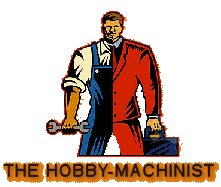- Joined
- Feb 13, 2017
- Messages
- 2,138
I use a Drill Doctor 750 for most stuff. Bits over 5/8" are hand-ground, use one of those cheap General protractor/drill guide to check the angle and depth relative the center.
Bruce
I place drills into basically four classes. There are the ones that are too big for a Drill Doctor. The "small" chuck version. I have a Darex "commercial" grinder that handles 1 inch, but it is a pain in the wazoo to use. They get done by hand on a low speed "water" grinder. The Darex grinder has many adjustments, but many of the really large drills are carbide tipped masonry drills and don't work on the wheels anyway. They must be done on a "green" wheel.
Then there are the ones that can be done on the Drill Doctor. Essentially, 1/2 down to 3/32 inch. That varies some, depending on how much I shake at the time. And how my eye feels. Losing vision in one eye cut into close work quite a bit. But they cover a majority of the drills. Metric (1-13mm), fractional(1/16-1/2"), number(1-60), and letter(A-Z) sets.
Below that, roughly Nr 55 down to about Nr 70 are also done by hand. Including a few of the fractional sizes. But on a Dremel with a "cut off" wheel. And under a bench glass so I can see what I'm doing. It is questionable how accurate the work is, but they cut well enough. For tap sizes, I don't depend on the full strength of the threads, so can use a slightly oversize hole if it comes about. Just how strong is a Nr 3/0-120 machine screw, anyway?
And lastly, from about Nr 70 down, the drills just get replaced with spares. I have tried to sharpen them, but it was debatable even when I was young and had good eyes.
A Nr 60 is the imperial equivilant to 1.0mm at 0.040". A Nr 80 is 1/3 that at 0.0135. The really small sizes are usually so a wire can be inserted. So final size is not that critical. I keep several sets of cheap drills for that specific purpose.
.


